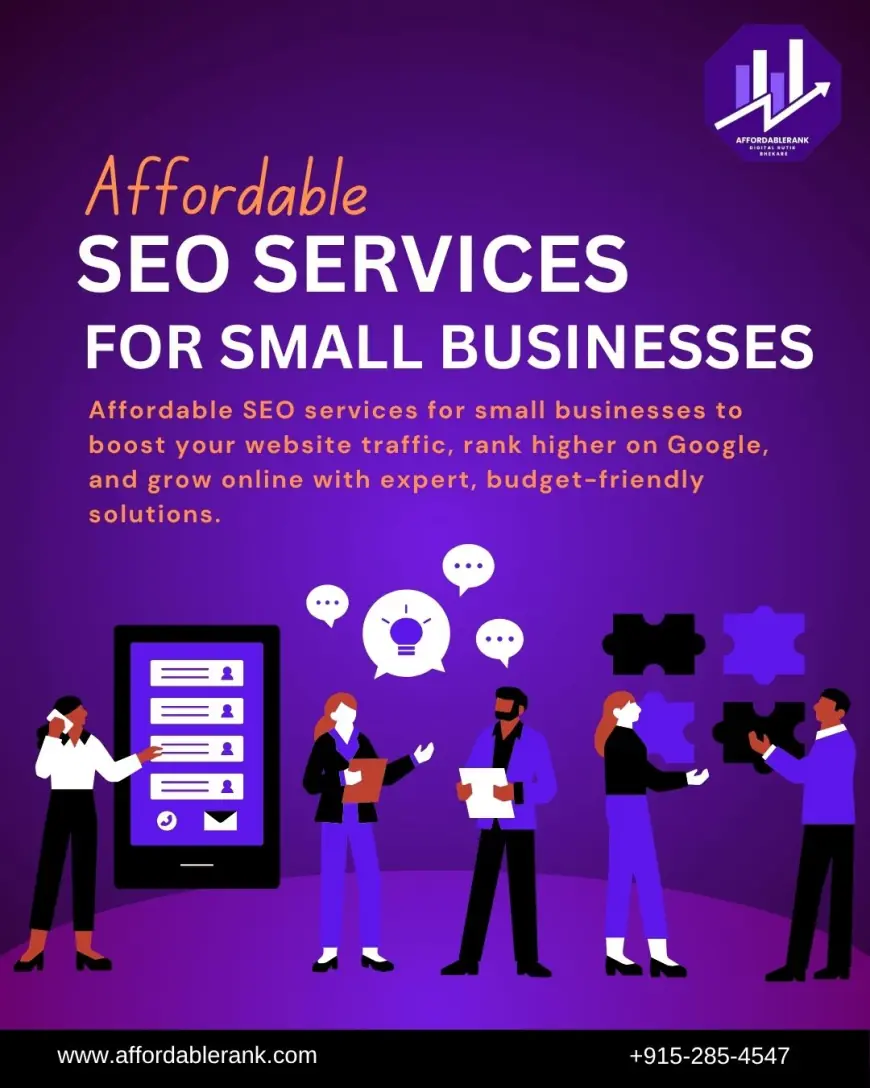Affordable SEO Services for Small Businesses: A Practical Growth Guide
Affordable SEO services for small businesses to boost your website traffic, rank higher on Google, and grow online with expert, budget-friendly solutions.

Small businesses often struggle to compete with large enterprises. But when they use SEO services, they unlock the power of online visibility. SEO levels the playing field, placing small brands in front of ready-to-buy customers through smart strategies and consistent optimization.
The digital marketplace keeps growing. Buyers search, compare, and decide online. If a business fails to appear on the first page of search results, it loses valuable traffic, engagement, and leads. Small businesses can’t afford that gap. SEO closes it.
Why SEO Services Matter for Small Businesses
Every small business needs attention online. With SEO, they earn it naturally—without paying for every click. Organic visibility builds trust, authority, and long-term brand equity.
Search engines like Google use over 200 factors to rank websites. SEO services optimize a business's website for those factors. That includes keyword targeting, technical fixes, backlink building, content strategy, and local optimization.
When all pieces align, search engines reward businesses with better rankings. And better rankings bring more traffic, leads, and sales.
How Local SEO Drives Small Business Growth
Local SEO gives small businesses a targeted edge. It focuses on making them visible to people searching nearby. Think “coffee shop near me” or “plumber in Andheri.” Those searches have strong purchase intent.
Local SEO focuses on:
-
Google Business Profile optimization
-
Local citations and directory listings
-
Location-specific keyword usage
-
Localized content creation
-
Reputation management with reviews
When small businesses rank in local packs or Google Maps, they attract foot traffic and phone calls without ad spend.
On-Page SEO Builds a Strong Foundation
On-page SEO starts with the website. Search engines must understand the site's content, structure, and value. Without strong on-page SEO, off-page tactics don’t deliver lasting results.
Key elements include:
-
Optimizing title tags and meta descriptions
-
Using header tags strategically
-
Placing keywords naturally in content
-
Internal linking between pages
-
Fast page speed and mobile responsiveness
-
Clear, user-focused site structure
When visitors enjoy using the site, search engines reward it. That alignment builds better engagement and trust.
Content Marketing Drives Organic Traffic
Search engines want to serve helpful content. That’s why content marketing plays a central role in SEO services. Blog posts, landing pages, FAQs, and guides—all increase keyword coverage and authority.
Small businesses can use content to:
-
Answer customer questions
-
Share product knowledge
-
Demonstrate expertise
-
Build internal links
-
Attract backlinks from other sites
Consistent, valuable content grows organic traffic month over month. It becomes a long-term business asset.
Technical SEO Helps Search Engines Crawl and Index
A website must work well behind the scenes. That’s where technical SEO comes in. It helps Google and other engines crawl, render, and index every page correctly.
Technical SEO services include:
-
Fixing broken links and redirects
-
Using HTTPS and secure protocols
-
Adding structured data (schema)
-
Creating and submitting XML sitemaps
-
Removing duplicate content
-
Optimizing robots.txt and crawl budget
With a technically sound site, businesses avoid penalties and ensure every page has ranking potential.
Backlink Building Increases Domain Authority
Backlinks act like votes of trust. When authoritative websites link to a business, search engines recognize its credibility. That drives higher rankings for relevant keywords.
Backlink building strategies include:
-
Guest posting
-
Niche directory submissions
-
Collaborations with bloggers or influencers
-
Creating shareable infographics or guides
-
Press mentions from local media
Quality matters more than quantity. A few relevant links from trustworthy sources carry more weight than dozens of weak links.
Mobile Optimization Improves User Experience
More people search from phones than desktops. Google uses mobile-first indexing, meaning it ranks sites based on their mobile experience.
Small businesses must offer fast, responsive websites. Mobile SEO includes:
-
Fast load times
-
Touch-friendly design
-
Clear call-to-action buttons
-
Optimized images
-
Minimal popups or distractions
Good mobile SEO keeps users engaged and reduces bounce rates—two critical signals for search engine rankings.
Keyword Research Aligns SEO With Buyer Intent
Every successful SEO campaign starts with keyword research. Businesses must target the right terms—ones customers actually search for.
Effective keyword strategy includes:
-
Long-tail keywords for niche visibility
-
Location-specific phrases
-
Buyer-intent search terms
-
Low-competition opportunities
-
Competitor keyword analysis
Small businesses can’t chase broad, high-competition keywords. Instead, they target focused terms that bring qualified traffic.
User Experience Shapes SEO Success
Search engines analyze how users interact with websites. If visitors bounce quickly or can’t find what they need, rankings drop. SEO services include UX improvements that align with both search engine algorithms and human expectations.
These changes include:
-
Fast-loading pages
-
Simple, logical navigation
-
Clear messaging
-
Engaging visuals
-
Easy conversions
When users feel confident and stay longer, SEO gains momentum.
SEO Audits Reveal Opportunities for Growth
Every small business benefits from a comprehensive SEO audit. It uncovers technical issues, keyword gaps, and opportunities to outperform competitors.
An SEO audit includes:
-
On-page analysis
-
Content review
-
Link profile evaluation
-
Speed and mobile checks
-
Competitor benchmarking
With this insight, businesses focus on what matters most and fix weaknesses before scaling.
SEO Services Build Long-Term Business Value
SEO delivers compounding returns. Unlike ads, which disappear when budgets stop, SEO continues to bring traffic after the initial investment. That makes it a smart long-term growth engine.
Businesses that commit to SEO see:
-
Greater brand visibility
-
Lower cost-per-lead
-
Higher website conversions
-
Stronger online reputation
-
Consistent organic growth
For small businesses with limited resources, SEO offers the most cost-effective way to grow sustainably.
Choosing the Right SEO Service Partner
Every small business needs an SEO provider who understands its goals. The right partner offers tailored strategies, not one-size-fits-all plans. They focus on local SEO, technical health, content relevance, and continuous improvement.
Look for SEO experts who:
-
Communicate clearly
-
Share transparent reports
-
Follow search engine guidelines
-
Offer measurable performance results
-
Understand local markets and customer behavior
Partnership drives success. When both sides collaborate, SEO services deliver lasting results.
Measuring SEO Performance with the Right Metrics
What gets measured gets improved. Businesses must track the right SEO metrics to evaluate success and adjust strategies.
Key SEO KPIs include:
-
Organic traffic growth
-
Keyword ranking improvements
-
Bounce rate and session duration
-
Conversions and lead forms filled
-
Backlink profile quality
-
Page indexing status
With consistent monitoring, small businesses stay agile and build on what works.
Myths About SEO Small Businesses Must Ignore
Several SEO myths hold businesses back. These false beliefs lead to wasted time and missed opportunities.
Let’s debunk them:
Myth 1: “SEO delivers instant results.”
Truth: SEO takes time. Results grow with consistency and patience.
Myth 2: “More keywords mean better rankings.”
Truth: Keyword stuffing harms SEO. Use terms naturally.
Myth 3: “Only big companies can rank.”
Truth: Local and long-tail SEO help small brands outrank larger ones.
Myth 4: “SEO ends after optimization.”
Truth: SEO evolves. It needs regular updates, content, and analysis.
Building SEO Into Business Strategy
Successful small businesses don’t treat SEO as a one-time project. They integrate it into marketing, operations, and customer service. SEO influences branding, sales, reviews, and user experience.
Smart businesses:
-
Involve SEO in website design
-
Create SEO-driven content calendars
-
Ask satisfied customers for Google reviews
-
Train staff to handle inquiries from organic leads
-
Sync SEO with email and social media
When SEO becomes part of the business DNA, growth becomes natural and consistent.
Real Results From Smart SEO Strategy
Many small businesses achieve remarkable results by focusing on the basics. They don’t chase hacks or shortcuts. Instead, they build strong content, fix technical gaps, and provide a great experience.
Examples include:
-
Local service providers ranking in Google Maps
-
Niche e-commerce stores dominating product searches
-
Consultants attracting leads through informational blogs
-
Restaurants filling tables from local SEO visibility
SEO works across industries. The key lies in customization, effort, and consistency.
Action Plan: Start SEO With Confidence
Small businesses ready to grow should take action today. SEO rewards those who start now and improve steadily. Here’s how to begin:
-
Audit the current website
-
Research local keywords
-
Fix on-page SEO issues
-
Claim and optimize Google Business Profile
-
Create helpful blog content
-
Build relationships for backlinks
-
Monitor performance and adjust often
SEO success doesn’t happen overnight—but it does happen for those who stay committed.
Conclusion
Every small business deserves visibility. SEO puts that power within reach. It doesn’t require a massive team or big ad budgets. It just takes strategy, consistency, and the right support.
Contact us to explore customized SEO services that grow your business step by step. Your customers search every day. Let them find you.
Frequently Asked Questions
1. What are SEO services for small businesses?
SEO services for small businesses include strategies like keyword optimization, content creation, local SEO, and technical improvements that help businesses rank higher in search engines and attract organic traffic.
2. Why is local SEO important for small businesses?
Local SEO helps small businesses show up in location-based searches, such as "near me" or city-specific queries. This improves visibility and drives foot traffic or service inquiries from nearby customers.
3. How long does it take to see SEO results?
SEO is a long-term strategy. While some improvements may appear within a few weeks, significant ranking gains and traffic growth usually take several months of consistent work.
4. Are SEO services worth it for small businesses?
Yes. SEO delivers long-term value, drives targeted traffic, builds brand trust, and helps reduce dependency on paid ads. It remains one of the most cost-effective digital marketing strategies.
5. What’s the difference between on-page and off-page SEO?
On-page SEO refers to optimization on the website itself—like meta tags, content, and structure. Off-page SEO focuses on external signals, like backlinks and brand mentions, to build domain authority.
6. How do I choose the right SEO service provider?
Look for a provider with local experience, transparency, clear communication, and proven results. Avoid agencies that guarantee instant rankings or use shady tactics.
7. What is keyword research in SEO?
Keyword research identifies the words and phrases potential customers type into search engines. It helps guide content creation and optimization to target relevant, high-intent searches.
8. Does SEO include content marketing?
Yes. Content marketing forms a core part of SEO. Creating high-quality, informative content helps attract links, boost keyword rankings, and engage users.
9. Can SEO work for all types of small businesses?
Absolutely. Whether it’s a local service provider, retailer, consultant, or restaurant—SEO can help drive relevant traffic and generate leads for any business type.
10. How do I know if my SEO campaign is working?
Track performance metrics like organic traffic, keyword rankings, bounce rates, and conversion rates. A steady increase in these areas indicates SEO success.
What's Your Reaction?
 Like
0
Like
0
 Dislike
0
Dislike
0
 Love
0
Love
0
 Funny
0
Funny
0
 Angry
0
Angry
0
 Sad
0
Sad
0
 Wow
0
Wow
0

















































